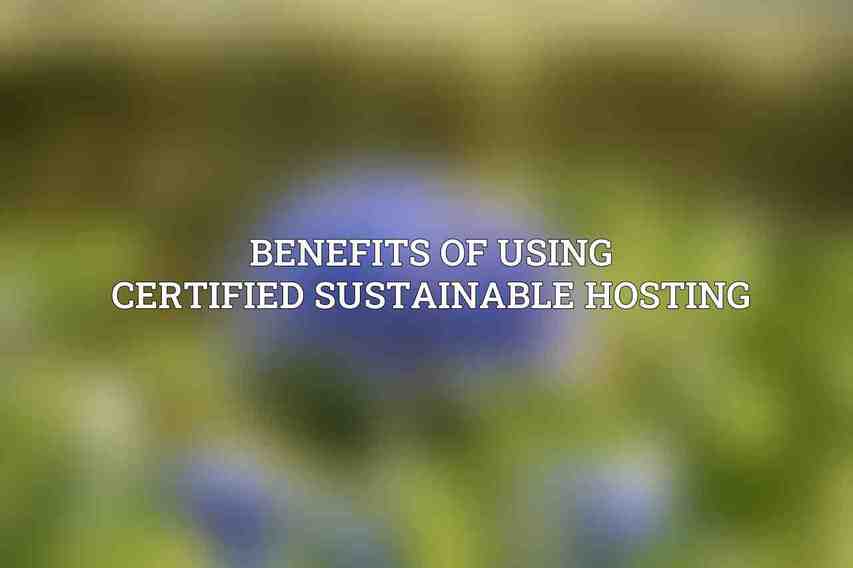Where the internet plays a pivotal role in our daily lives, the environmental impact of web hosting is a growing concern. Sustainable web hosting has emerged as a crucial solution to reduce the carbon footprint and promote eco-friendly practices in the digital realm. To ensure that web hosting services align with sustainable practices, various eco-certifications have been established to recognize and validate environmentally responsible hosting providers. This article delves into the significance of these certifications and highlights the key eco-certifications essential for sustainable web hosting.
Understanding Sustainable Web Hosting Certifications
Definition of Sustainable Web Hosting
Sustainable web hosting refers to the practice of utilizing environmentally friendly technologies and strategies to minimize the carbon emissions and ecological footprint associated with hosting websites and data centers. By adopting sustainable practices, web hosting providers aim to reduce energy consumption, optimize resource utilization, and promote environmental stewardship in their operations.
Benefits of Choosing Certified Sustainable Hosting
Opting for certified sustainable hosting services comes with a myriad of benefits, including: Find more on Benefits of Choosing Eco-Friendly Hosting with GreenGeeks
– Environmental Conservation: Certified hosting providers adhere to strict environmental standards, leading to reduced carbon emissions and resource conservation.
– Cost Savings: Sustainable practices often translate to lower energy costs, enabling businesses to save on operational expenses.
– Enhanced Reputation: By showcasing eco-certifications, companies can enhance their brand reputation by demonstrating a commitment to sustainability and environmental responsibility.
Key Eco-Certifications for Web Hosting
Energy Star
Energy Star certification is a widely recognized symbol for energy efficiency, including in data centers. This certification focuses on reducing energy consumption and promoting sustainable operations. Key aspects of Energy Star certification for data centers include stringent energy efficiency requirements, energy management best practices, and a commitment to continuous improvement in energy performance.
Green Seal
Green Seal is a nonprofit organization dedicated to promoting environmental sustainability through its certification programs. The Green Seal Web Hosting Standard sets criteria for hosting providers to minimize environmental impact, improve energy efficiency, and implement sustainable practices. To achieve Green Seal certification, providers must meet specific requirements related to energy conservation, waste reduction, and eco-friendly operations.
ISO 14001:2015
ISO 14001:2015 is an international standard for Environmental Management Systems (EMS), outlining requirements for organizations to establish and maintain environmental policies and objectives. Companies seeking ISO 14001 certification must demonstrate a commitment to environmental performance, compliance with regulations, and continuous improvement in environmental management practices. This certification signifies a company’s dedication to environmental responsibility and sustainability.
B Corp Certification
B Corp certification is awarded to companies that meet rigorous social and environmental performance standards set by B Lab. The B Corp movement emphasizes the significance of using business as a force for good, prioritizing social and environmental impact alongside profit. Obtaining B Corp certification showcases a company’s commitment to responsible business practices, sustainability, and stakeholder welfare.
Other Notable Sustainability Standards
Climate Neutral Data Center Pact
The Climate Neutral Data Center Pact is a commitment by data center operators to achieve climate neutrality by 2030. Signatories of this pact pledge to measure, report, and reduce greenhouse gas emissions associated with data center operations. By implementing sustainable practices and transparent reporting, data centers can contribute to global efforts to address climate change and environmental sustainability.
Green Grid Data Center Sustainability Metrics
The Green Grid is an industry consortium focused on improving data center resource efficiency and sustainability. The Data Center Sustainability Metrics provide a framework for measuring and evaluating the environmental impact of data center operations. These metrics cover aspects such as energy efficiency, water usage, carbon emissions, and waste management, enabling data center operators to assess and improve their sustainability performance.
Choosing the Right Certification for Your Needs

Considerations for Selecting a Certification
When selecting a certification for sustainable web hosting, consider the following factors:
– Specific Goals: Determine your sustainability goals and priorities to align them with the certification requirements.
– Industry Standards: Choose certifications that reflect industry best practices and are recognized within the web hosting sector.
– Credibility: Select certifications with established credibility and recognition in the sustainability field to validate your commitment to eco-friendly practices.
Evaluation Process for Choosing a Certified Hosting Provider
To ensure you choose a reputable and sustainable hosting provider, follow these steps:
– Review Credentials: Evaluate the certifications held by hosting providers to confirm their commitment to sustainability.
– Assess Sustainability Practices: Investigate the provider’s environmental initiatives, energy efficiency measures, and waste management strategies.
– Verify Compliance: Ensure that the hosting provider complies with industry standards and regulations relevant to sustainable operations.
Benefits of Using Certified Sustainable Hosting

Environmental Impact Reduction
Certified sustainable hosting contributes to environmental conservation through:
– Energy Efficiency: Lower energy consumption and reduced carbon emissions help mitigate environmental impact.
– Resource Conservation: Practices like water conservation and waste management promote sustainable resource utilization.
Enhanced Brand Reputation
By opting for certified sustainable hosting, businesses can benefit from:
– Environmental Responsibility: Demonstrating a commitment to sustainability improves brand perception and customer trust. Find more on Top Green Web Hosting Providers for Eco-Friendly Websites 2024
– Positive Image: Enhanced brand reputation as an environmentally conscious organization can attract eco-minded customers and partners.
Cost Savings and Efficiency
Certified sustainable hosting leads to:
– Lower Operating Costs: Reduced energy expenditures and optimized resource utilization result in cost savings.
– Improved Performance: Efficient operations and sustainable practices enhance overall performance and resource efficiency. Learn more about What Users Love About GreenGeeks Sustainable Web Hosting
Sustainable web hosting certifications play a vital role in shaping the future of eco-friendly digital practices. By choosing certified hosting providers adhering to stringent environmental standards, businesses can reduce their carbon footprint, enhance their brand reputation, and contribute to a greener future. Embracing sustainable hosting practices and obtaining eco-certifications are essential steps towards building a more sustainable and responsible online ecosystem. Check this blog on The Environmental Impact of Web Hosting and How to Reduce It
Remember, as we navigate through the digital world, let us prioritize sustainability and responsibility in our web hosting choices for a brighter and greener future. Learn more about Why Businesses Are Switching to GreenGeeks for Sustainable Web Hosting
Would you like to know more about sustainable web hosting?
Frequently Asked Questions
What is eco-certification?
Eco-certifications are certifications given to businesses or products that meet certain environmental standards. These certifications ensure that practices are in place to minimize the negative impact on the environment.
Why are eco-certifications important for web hosting?
Web hosting requires a lot of energy to power servers and cooling systems. By choosing a web hosting provider with eco-certifications, you can ensure that the environmental impact of your website is minimized.
What are some essential eco-certifications for sustainable web hosting?
Some essential eco-certifications for sustainable web hosting include Energy Star, Green-e, LEED, ISO 50001, and EPEAT. These certifications ensure that a web hosting provider is using energy-efficient practices and sustainable resources. Find more on Inside GreenGeeks: Technology Powering Sustainable Web Hosting Find more on How GreenGeeks Champions Sustainable Web Hosting
How can I find out if a web hosting provider has eco-certifications?
You can usually find information about a web hosting provider’s eco-certifications on their website or by contacting their customer support. Look for logos or certifications listed on their website that indicate their commitment to sustainable practices.
Are there any benefits to choosing a web hosting provider with eco-certifications?
Yes, choosing a web hosting provider with eco-certifications not only helps reduce your carbon footprint, but it also shows your commitment to sustainability to your audience. It can also lead to cost savings in the long run by reducing energy consumption.

